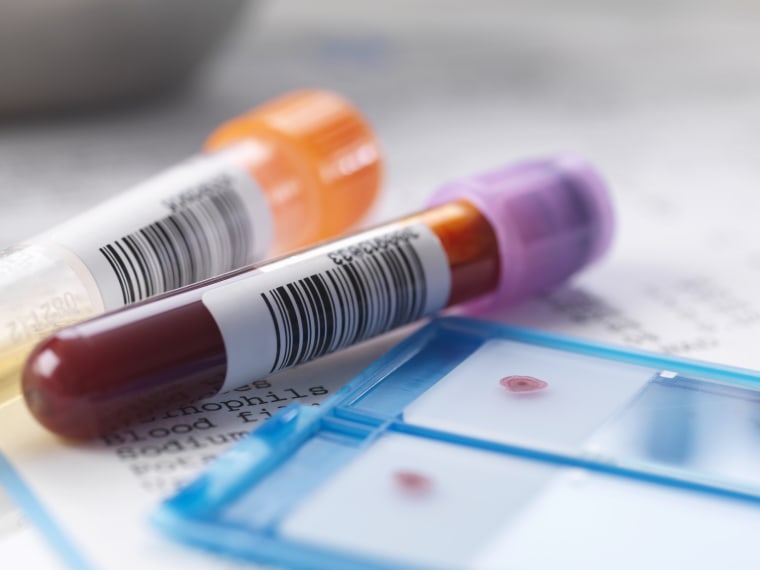The controversial PSA blood test can save some men's lives from prostate cancer, an influential federal panel said in new screening guidelines.
Every man between the ages of 55 and 69 is advised to talk to their doctors about taking the prostate-specific antigen blood test, according to recommendations released Tuesday by the U.S. Preventive Services Task Force.
The draft of the guidelines signals a major shift in prostate screening advice for men, which in 2012 discouraged testing for healthy men of any age. The task force recommends that doctors have a conversation with their male patients who don't have signs or symptoms of the disease about the benefits and drawbacks of taking the prostate-specific antigen blood test. Because prostate cancer is often a slow-growing disease, the panel still recommends against the test for men 70 and older.
“The balance of benefits and harms is still close and so that's why we're recommending that every man between the ages of 55-69 talk to his doctor ... and then make his own decision after these discussions," Dr. Kirsten Bibbins-Domingo, chair of the USPSTF and professor of medicine at the University of California San Francisco Medical Center, told NBC News. "It's really a personal choice."
Related: New Reports May Help Men Choose Prostate Cancer Treatment
A Small Benefit
Previously , medical evidence suggested that routine screening did not save lives and might lead to treatments that could cause incontinence, impotence and pain for men. The 2017 draft of the recommendations is based on new findings which tracked the effectiveness of PSA testing in clinical trials. After following patients for a longer period of time, it was shown that for every 1,000 men screened, one to two lives were saved.
“We are more confident about the benefits of screening,” said Bibbins-Domingo. “We now think, on balance, there is a small benefit.”
Almost 240,000 new cases of prostate cancer are diagnosed each year. It killed over 25,000 men in 2016. While some men may have symptoms, such as trouble urinating or back pain, for most the disease is silent.
The new guidelines bring the task force more in line with other groups — such as the American Urologic Association, the American College of Physicians, and the American Cancer Society — which have still encouraged patients and doctors to discuss the test.
Related: Study Finds New Ways to Know if Prostate Cancer is Dangerous
However, the task force recommendations typically carry the most weight with doctors.
“I am very positive on their new recommendation,” Dr. Otis Brawley, chief medical officer for the American Cancer Society, told NBC News.
Rise of 'Active Surveillance'
The blood test isn't a diagnosis of cancer and it isn't good at detecting whether high levels of protein-specific antigens — a substance made by both good cells and cancer cells in the prostate — indicate cancer or are harmless.
In the past, PSA tests indicated tumors in men, which may never have caused them problems. The results led to unneeded biopsies, radiation, or surgeries that had life-altering side effects.
According to the Mayo Clinic, factors that can raise a PSA level, but aren't cancer, include:
- Ejaculation
- Bike riding, possibly because the seat puts pressure on the prostate.
- Older age: PSA levels normally go up as men age, even if there's no abnormality in the prostate.
Now, rather than invasive treatments, men are more often just watched closely by their doctors.
“Because of the rising use of active surveillance, some are getting more years of life without side effects,” said Bibbins-Domingo.
Identify Lethal Cancers
Urologist Dr. Edward Schaeffer, an advocate for widespread prostate cancer screening, welcomed the new report.
“These revisions will increase our opportunity to identify cancers with lethal potential,” said Schaeffer, chair of urology at Northwestern University Feinberg School of Medicine and Northwestern Medicine. “With active discussions between physicians and patients, individuals will be able to make the right decision for themselves.”
Schaeffer, who treated the actor Ben Stiller for aggressive prostate cancer, led a controversial 2016 study that found cases of metastatic prostate cancer — the type that has started to spread in the body — nearly doubled in men aged 55 to 69 since 2004.
Report: Cases of Aggressive Prostate Cancer on the Rise
Some patients such as African-Americans or those with family history of prostate cancer are at risk of developing aggressive disease at a younger age. The panel made no special recommendations for these groups.
Dr. Therese Bevers, medical director for Cancer Prevention at the MD Anderson Cancer Center, said that some men are often poor advocates for their health and may still not ask about their PSA. Now, primary care doctors may bring up the test more.
“There will be new discussions that did not previously occur in the primary care setting,” Bevers told NBC News.
Anthony Serritella is a medical fellow with NBC News. He is currently a medical student at the Johns Hopkins School of Medicine.
